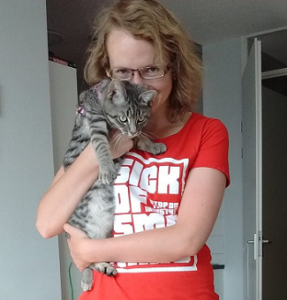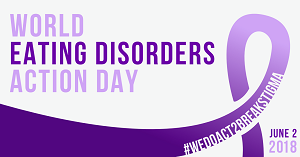Breaking the eating disorder stigma: What’s white and skinny got to do with it?
Breaking the eating disorder stigma: What’s white and skinny got to do with it?

by Merle (The Netherlands)
Many people have an idea of what a person with an eating disorder looks like. Commonly they imagine this person is a skinny white girl who is starving herself and wants to be ultra-thin so she can be a model or ballerina. I have been that skinny white girl, but I have never wanted to be a model or dancer. I just wanted to vanish. My illness developed as a way to avoid difficult thoughts about choices I needed to make in life and coping with changes, such as starting university or a death in my family.
For a long time I did not tell the truth about if or what I had eaten. I avoided eating with others, and all social occasions where food was served. I ate too little and moved and exercised too much. This helped me to feel in control of my life. It was the only control I could exercise, because, as I know now, an eating disorder is not a personal choice; it is not in your hands.
Secrets and isolation
There were many reasons why I didn’t want to talk about my eating disorder, as this was my secret, meant only for me to know. I was afraid that people would have made me eat and my sense of control would have been gone. For a long time, no one noticed my eating disorder symptoms. I was living on my own and that allowed me to just do things in my own way – too little food, missing meals, frequent over-exercising – to avoid any change of plans. Hiding weight loss with more layers of clothes was possible up to a point. When the summer came and I was still hiding under many layers, cold and shivering and when I needed to go to the beach, people began to notice.
You can look okay and have an eating disorder
Although effects of anorexia nervosa are often visible, this is not the case for other eating disorders. It is important to understand that you can have anorexia nervosa, bulimia nervosa, binge eating disorder or an atypical eating disorder without it being visible to others. You do not need to be underweight to have an eating disorder, as in the latest edition of DSM (1), the diagnostic manual for psychiatric illnesses, even with anorexia nervosa the BMI criterium has been replaced by “significantly low body weight” in context of the individual and all the other eating disorders that are also more common than anorexia nervosa (2). Although I would say that I was that “classical” case of someone who is Caucasian, high-achieving, perfectionist and sportive, I’m just one out of many. Eating disorders are not a choice and they can happen to anyone from any race, socio-economic background or personality. We are still living in a world where it is not easy to access help, especially for people from minorities or non-Caucasian background (3). This needs to change.
Feeling ashamed to talk about it
When I accessed health services and started therapy, some people knew, but I felt ashamed to talk to them about it. I didn’t want to be judged by people who have prejudice. Being seen as someone who is sick, mentally ill, was not a part of my plan, as this would mean being weak. I was afraid of my parents being judged by others for not keeping an eye on me or not taking good care of me. I didn’t want to be labelled as, or be defined as, that young woman with an eating disorder, because I was much more than the eating disorder.
In brief moments of healthy contemplation I could understand that I needed to change my behaviors, which were of the eating disorder, because this way of coping was not good for me. I remember reading about consequences of a long-term eating disorder and feeling desperate.
Facing the fears and breaking free
After only a year in therapy I could understand that the eating disorder is something that has developed, that it’s not healthy me, and that I can break free. I started questioning my thoughts and thinking which of them really belonged to me. Was it really me who wanted to scream at my partner for making pasta – a fear food – or was it the eating disorder? I came to relativize these thoughts: why was I afraid of pasta and was it really true, that I would gain weight after eating it. And if I were to gain weight, what would happen? Actually, my life has gotten only better when gaining weight.
Finding strength and fresh perspectives in stories of recovery
After recovery, I started to talk more about this period in my life. I started helping others. I contacted an organisation where I received help for myself from people who had recovered and, after my training there, I began to help people with eating disorders in one-to-one sessions, guide two groups, and to occasionally help people online. I also have been able to help a couple of people who are very close to me to overcome their eating disorder.
I found much understanding in other people. I was asked questions and I could explain. Sometimes, a colleague or an acquaintance would ask me how to behave if, for example, their flatmate with an eating disorder would stare at them when they ate or say something judging. I would explain that this is fairly typical of the illness: that they are very focused on food and very stuck in their rigid thought patterns. Sometimes it can be surprising to someone with an eating disorder to see how other people can just eat food without first giving it a lot of thought.
I am much more than an eating disorder
Increasingly, I see that I am much more than that woman with an eating disorder. I am a human being, I am a daughter, a partner, a friend, a colleague and, hopefully, one day a mother.
Eating disorders are about far more than food. They are a way of coping and give a false sense of control. Unfortunately this form of coping is unhealthy and self-destructive. Eating disorders are an illness that nobody chooses to develop. Engagement in eating disorder behaviours can unconsciously develop as a way to cope with anxiety or to avoid or suppress painful or scary feelings.
Talking our experience and scientific facts will help a lot
We need to talk more about eating disorders and explain what it feels like when symptoms are developing, and how the behaviours impact functioning in everyday life. We also need to talk more about the challenges in recovering and getting our life back on track.
Friends and family can assist by having a sufficient knowledge to know what is relevant to say and what to avoid. For example, some “triggers” such as naming the weight and BMI is not helpful. I believe that everyone in our society should be able to hear these messages. Therefore, Internet platforms and social media, and also local TV, radio or newspapers can help to spread the word and reach more people. Telling our stories is relevant, but it is also important to provide evidence-based information and scientific facts with it. In this way we will reduce the stigma and shame and move towards a brighter future.
About Merle
I’m a young woman in my mid-twenties, living in the Netherlands. Currently I’m doing my training to become a physician; besides this I work in the local hospital. During my free time, I practice yoga, walk, run, and read a lot. I got firsthand experience of an eating disorder from the age of 17, and after six years of suffering from it, I started the journey of several therapies. For more than a year I can say that I’m recovered. I volunteer in an organization that couples people with mental illnesses to people who have recovered. I hope to make a change with this and throughout my job in the future.
References
- Diagnostic and Statistical Manual of Mental Disorders : DSM-5. 5th ed. Arlington, VA: American Psychiatric Association; 2013. http://dsm.psychiatryonline.org.proxy-ub.rug.nl/doi/full/10.1176/appi.books.9780890425596.dsm10
- (2) Hoek H, van Hoeken D. Review of the prevalence and incidence of eating disorders. International Journal of Eating Disorders. 2003;34(4):383-396.10.
- Cachelin FM, Rebeck R, Veisel C, Striegel-Moore RH. Barriers to treatment for eating disorders among ethnically diverse women. International Journal of Eating Disorders. 2001;30:269–278.[PubMed]
 Take part in World Eating Disorders Action Day
Take part in World Eating Disorders Action Day
World Eating Disorders Action Day on June 2, 2018 is a grassroots movement designed for and by people affected by an eating disorder, their families, and the medical and health professionals who support them. Uniting activists across the globe, the aim is to expand global awareness of eating disorders as genetically linked, treatable illnesses that can affect anyone. The Third Annual #WorldEatingDisordersDay will take place on June 2, 2018 with a focus on breaking stigma about Eating Disorders. #WeDoAct2BreakStigma.
Join the virtual campaign on social media and host a local event to share information and advocate for policy change to ensure access to evidence based treatment for all affected.





